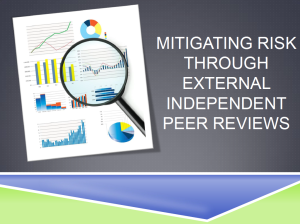We’ve been talking a lot lately about how and where Independent Review Organizations, or IROs, fit into denial management. The Peer Review process, which brings in an unbiased third party to help alleviate the pressure of reviewing claims, is an essential part of denial management.
We’ve been talking a lot lately about how and where Independent Review Organizations, or IROs, fit into denial management. The Peer Review process, which brings in an unbiased third party to help alleviate the pressure of reviewing claims, is an essential part of denial management. We’ve touched on many of the different benefits of IROs in previous blog posts, from how they affect your ROI to how they bring specialized expertise to reviews. This blog post focuses on the four main ways IROs and external reviews can help eliminate risk within your organization.
1. Improving Documentation
Having an external reviewer, who is often a peer, can help ensure physicians pay closer attention to detail and documentation. Attention to detail and accuracy are key to reducing error and the possibility that an external review will be needed. By helping encourage double-checking and accuracy, IROs help reduce risk on the back-end, which in turn effects your ROI.
2. Uncovering Internal Issues
External reviews help you discover issues that might lie within your organizational structure, whether that is physician specific, event specific or even organization based. Deeper issues can be brought the surface because of external reviews. By bringing these issues to the surface external reviews help address these problems in a timely manner. Uncovering and addressing organizational issues is a key way IROs help to reduce risk and the potential of malpractice or litigation.
3. Reduce Conflicts of Interest
The certification of External reviewers and the review process help to ensure that there are no conflicts of interest between reviewers or at the organization level. When it comes to specific cases/reviews, an organization is required to certify that there are no conflicts of interest at the organization level. The same is required of the reviewer. This helps reduce any risk that there might be a conflict of interest that could negatively impact a review.
4. Increase Quality
IROs help improve member satisfaction through provision of an unbiased, evidenced-based external determination. IROs have a standard set criteria that guide decision-making and use the latest technology, helping to increase the quality of care your organization provides. Since reviews are based purely on the fact that they provide unbiased decision, your staff can rest assured that their decision-making abilities won’t be questioned. By freeing up medical directors and other administrators, external reviews ensure that executive staff can spend less time with the administrative burden and deal with larger tasks as needed.









